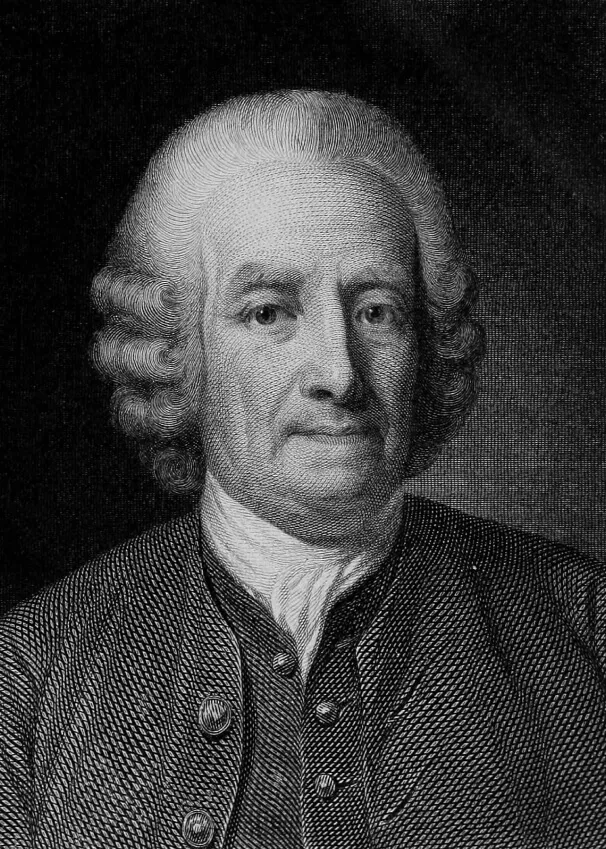
About Emanuel Swedenborg
The New Church draws on the spiritual writings of Emanuel Swedenborg, a remarkable mystic, Christian theologian and author who was born in 1688. The New Church organisation began in the late 18th century with a small number of people who shared a strong love for Swedenborg’s writings.
Swedenborg himself did not intend to establish a church; rather, he believed that the ideas contained in his writings would positively influence the religious beliefs of his time.
Swedenborg began his career with a strong interest in science during the Age of Reason, a period marked by new and expansive ideas. He possessed a remarkable intellect, which he applied first to the natural sciences, then to philosophy, and eventually to the mystical and spiritual dimensions of life.
Throughout his life, Swedenborg sought to understand the essence of all things and developed practices of meditation and controlled breathing to explore deeper truths. At age fifty-five, he underwent a profound two-year transformation during which he documented and interpreted his dreams. This led to a series of visions of the Lord Jesus Christ, bringing him deep peace and profound faith.
From this point onwards he wrote exclusively on spiritual matters, with his mind opened to the spiritual dimension, where he engaged with angels and other spiritual beings. At the same time he continued to lead an active and practical life in the everyday world, making significant contributions to the advancement and prosperity of Sweden.
The primary topics covered in Swedenborg’s writings include the afterlife, biblical commentary and symbolism, the nature of the Divine, Christian theology, spiritual growth, and the complementary nature of the sexes. His books are a vast field of exploration in which religion is revealed to be a rich understanding of life on both the personal and the universal levels. He died in London in 1772 at the age of 84, a quiet and well-thought of person whose sincerity spoke for itself. Many people, including some very well-known figures, have paid tribute to Swedenborg, to his writings, and to the insights found within these pages.
More on Swedenborg
Swedenborg Starter’s Reading Kit
Want to dig into Swedenborg’s writings, but not sure where to start? This page includes some introductory videos, links to books that provide a good overview of his theology, and some of his most popular works.
Read More >
Swedenborg’s Life
The life of Emanuel Swedenborg (1688-1772) was defined by his attempt to understand how the universe works. After a youth spent studying everything from astronomy and mechanical engineering to anatomy, his deep faith led him into direct contact with the spiritual world. From midlife onward, he devoted himself to writing about his new understanding of life, the Lord, and the Bible, in the hopes of bringing a message of spiritual hope and comfort to the world.
Swedenborg’s Theology
Swedenborg’s theology centers on the idea of a deeply spiritual, loving, and interconnected reality where God is understood as pure love and wisdom. His teachings emphasize that true religion is lived through love and service to others, and that the Bible has a deeper, symbolic meaning revealing spiritual truths. Swedenborg described the afterlife as a continuation of our spiritual growth, where individuals freely choose heaven or hell based on their inner love and actions. His visions and writings convey a dynamic spiritual world where angels, spirits, and divine love influence human life, aiming to transform human understanding and draw people closer to God.
Swedenborg’s Cultural Influence
Swedenborg’s writings have had a significant and lasting impact on culture, inspiring a diverse range of influential figures, including writers, artists, philosophers, and social reformers. His ideas have shaped movements in literature, such as Romanticism and Transcendentalism, and influenced figures like William Blake, Ralph Waldo Emerson, and Helen Keller. His teachings on spirituality has permeated religious and philosophical thought, leaving a subtle yet profound mark on Western culture and the arts.
Swedenborg’s scientific accomplishments
Swedenborg was a pioneering scientist and polymath, making significant contributions to fields such as anatomy, engineering, mineralogy, and cosmology during the 18th century. He was ahead of his time in proposing ideas like the nebular hypothesis of the formation of the solar system and conducting detailed studies on the human brain and nervous system. His scientific works reflect a keen analytical mind and a deep curiosity about the natural world, laying the groundwork for later discoveries. This scientific foundation informed his later spiritual writings, as he sought to bridge the material and spiritual aspects of existence.
Influences, tributes, testimonials
Swedenborg has been honoured by numerous distinguished figures across history for the depth and transformative nature of his work. Renowned writers, philosophers, scientists, and social reformers have praised his unique insights into spirituality, the human condition, and the nature of the afterlife. Figures such as William Blake, Ralph Waldo Emerson, and Helen Keller found profound inspiration in his writings, and many have lauded his visionary blend of science and spirituality as both groundbreaking and deeply meaningful. Swedenborg’s influence continues to resonate, leaving a lasting legacy of admiration and respect among thought leaders across diverse fields.
Here are some of their acknowledgments to him and the message that he had to deliver:
“I acknowledge my profound indebtedness to Swedenborg for a richer interpretation of the Bible, a deeper understanding of Christianity, and a precious sense of the Divine presence in the world.” Helen Keller
What we find in Swedenborg is the most detailed description of spiritual life that has been given anywhere in the world. It is far more detailed, far more descriptive than any other writer in the whole history of mankind.” Dr Philip W Groves
“Swedenborg’s visions are worthy of the attention of painters and poets; they are the foundation for grand things.” William Blake
“I admire Swedenborg as a great scientist and a great mystic at the same time. His life and work have always been of great interest to me!” Carl Gustav Jung
